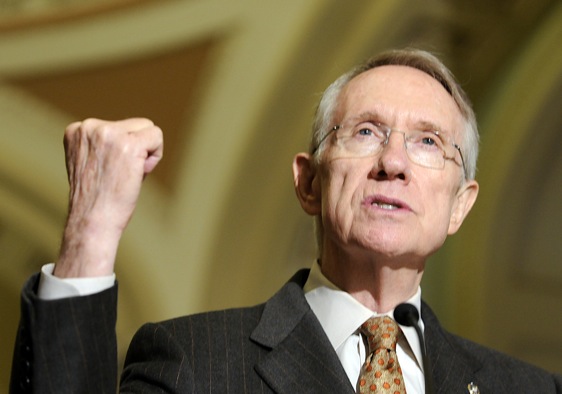Senate Public Option Deal Fuels Uncertainty « The Washington Independent
Jul 31, 20206.2K Shares261.8K Views
Senate Majority Leader Harry Reid (D-Nev.) (The Washington Times/ZUMA Press)
Announcing the Democrats’ tentative deal on a public option, Senate Majority Leader Harry Reid (D-Nev.) said last night that the nascent proposal strikes a good balance between liberals, who say a federal plan will lower patient costs, and conservatives who want to limit the government’s hand in private markets.
“It has something that we think should satisfy everybody,” Reid said.
Well, maybe. But it also has something to rile everybody, which leaves the future of the still-vague proposal very much uncertain.
[Congress]Although Democratic leaders are keepingthe details largely under wraps, the leaked elements include provisions that will be difficult to swallow for those on both sides of the nettlesome debate over the public insurance plan. Indeed, while the week-long negotiations were designed to win agreement between liberal and conservative Democrats, key figures representing both camps are still declining to endorse their supposed deal. Sen. Russ Feingold (D-Wis.), for example, has expressedreservations, and Sens. Mary Landrieu (La.) and Blanche Lincoln (Ark.) saidWednesday that they won’t advocate for the proposal before they see a cost estimate.
Central to the Democrats’ compromise is reportedlya strategy to table the public option in favor of hybrid national plans to be regulated by the government but administered by private companies. If those companies failed to meet certain cost and coverage thresholds, it would trigger the creation of a full-scale public option to compete directly with private plans.
The “trigger” proposal is hardly new to the health reform debate, and it’s certain to meet with resistance. Although Sen. Olympia Snowe (Maine), the only Republican to support the Democrats’ health reforms, has endorsedthe trigger, others have vowed to kill the overall bill if such a mechanism is included. Sens. Bernie Sanders (I-Vt.) and Roland Burris (D-Ill.), for example, say the trigger doesn’t go far enough to encourage private companies to keep plans affordable, while Sen. Joe Lieberman (I-Conn.) has saidit goes too far to encroach on private markets.
Even Sen. Jay Rockefeller (D-W.Va.), one of the 10 Democratic negotiators who crafted the compromise, has argued this year that the trigger proposal is a punt. “Historically, ‘trigger’ mechanisms have not been successful, and they are not a substitute for a strong public health insurance option,” Rockefeller saidin an October statement, likely referring to the trigger in Medicare’s prescription drug benefit that was never pulled. “A ‘trigger’ simply delays price competition.”
Rockefeller’s office did not respond to a request for comment Wednesday.
Furthermore, the proposal to have the insurance companies administer the national plans leaves in place the same profit motive for denying claims that Democrats have attacked throughout the health reform debate.
“This legislation cannot simply be a huge subsidy to private insurance companies that will get millions of new customers and be able to raise their rates as high as they want,” Sanders saidlast month.
There are other red flags in the Democrats’ public-plan compromise. One provision, for example, would extend Medicare eligibility to include those aged 55 to 64. Liberals have long called for such an expansion of the single-payer Medicare program, but concerns have swirled around the level of reimbursement for health care providers, many of whom complain that rates are too low to see Medicare patients. A September studyconducted by the Center for Studying Health System Change found that just over half of the nation’s doctors accept all new Medicare patients, while almost 14 percent will see none at all.
“Are providers going to be reimbursed at Medicare rates? That’s certainly going to be the issue,” said Julius Hobson, former lobbyist for the American Medical Association and now health policy analyst with the Washington-based law firm Bryan Cave.
Still another element of the Democrats’ deal would reportedly force private insurers to spend no less than 90 cents of each premium dollar on health-care services, as opposed to ads, salaries and other administrative costs. That proposal, however, is sure to rouse the opposition of the powerful insurance lobby and conservative lawmakers already critical of the degree to which the Democrats’ health reform bill intervenes in the private marketplace.
And it’s not only conservatives who might be wary. Indeed, when Rockefeller proposed a similar provision during the Senate Finance Committee’s debate on health reform, liberal Sen. Jeff Bingaman (D-N.M) emerged as one of the vocal opponents. Bingaman said the amendment, which would have set the floor at 85 cents on the dollar, was inappropriate “without more understanding of … what it will do to the insurance markets.”
These sticking points do nothing to mention the opposition that will likely surface in the House, where Speaker Nancy Pelosi (D-Calif.) has made the public option a centerpiece of the chamber’s health reform legislation.
The Democrats’ proposal is still young, of course, and by declining to release the details, Democrats have left themselves plenty of room to tweak the compromise in order to lure broader support. Still, with so many constituencies to satisfy at once, the bill’s success might just hinge on whether or not lawmakers are willing to hold their noses and vote in favor of major provisions they adamantly oppose. If Sen. Tom Harkin (D-Iowa) is any indication, that tendency might already be happening.
“Do I like it?” Harkin saidTuesday when asked about the compromise. “No, but I’m going to support it to the hilt.”

Hajra Shannon
Reviewer
Latest Articles
Popular Articles
